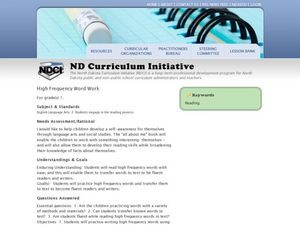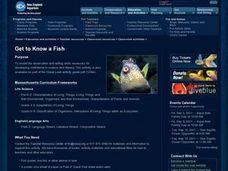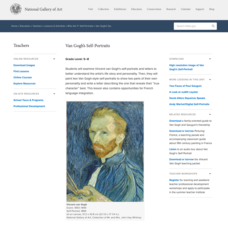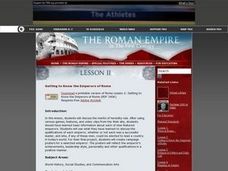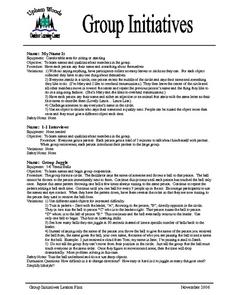Curated OER
Star Student of the Week Letter
Honor each individual in your class by setting aside a week for each learner. Send out a copy of this letter and the materials listed in it each week to the parents or guardians of a particular pupil.
Curated OER
High Frequency Word Work
First graders make an "All About Me" book. In this high fluency words lesson students use a computer program to create a book about themselves. Students write their own text.
Curated OER
How To Calm Back-to-School Nerves
Set students up for success with these tips for getting the year off to a smooth start.
Curated OER
Back-to-School Night: What Parents Need to Know
Get prepared for your Back-to-School Night presentation with these tips and ideas.
Curated OER
Writing Diagnostics and Introduction to Literary Terms
Assess your new learners' writing abilities and knowledge of literary terms with these diagnostic activities. Part of a back-to-school unit, this is meant to provide the teacher with information about the ability levels of their class....
Youthlinc
Financial Literacy: Money Attitudes Lesson Plan
Going once, going twice, sold! An auction provides class members with an opportunity to examine their attitudes toward money. After bidding on and purchasing items, individuals complete an attitude survey and then identify a goal that...
Curated OER
Get to Know a Fish
Students discover the anatomy of a fish by identifying its body parts. In this oceanography lesson, students view a live fish in their classroom and draw a poster of the fish one body part at a time while identifying it. Students...
Curated OER
Simon Says "Who Are You?"
Students explore their similarities and differences. In this getting to know you lesson, students play a variation of "Simon Says," according to various personality and physical traits.
Curated OER
First Day Lesson Plan
Students participate in a first day icebreaker activity. In this icebreaker lesson, students are paired up and film their partner doing something unique. Students continue to film eachother while conducting a short interview.
Intel
Forensics: Get a Clue
Although the methods are all scientific, forensic science was started by police officers rather than scientists, who relied on observation and common sense. Young detectives use many tools to solve crimes around the school in a...
Curated OER
Black Tiger Academy Martial Arts Fitness Unit – Lesson 2
”If you think you can, you can. And if you think you can't, you're right.”—Henry Ford. Black Tiger Academy’s martial arts lesson two of 20 continues with the class getting to know each other. There is review of the crane stance, the cat...
Curated OER
Prehistoric Pen Pals
Students read online information and identify relevant information about a particular dinosaur species, assume the personality of a specific dinosaur species, and write online "getting to know you" letters to other student-dinosaurs in...
Teach Engineering
The Grand Challenge: Fix the Hip Challenge
It may be time to get to know the skeletons in your family. The first lesson in a series of 5, introduces the class to the concept of osteoporosis. The class members brainstorm possible causes and whether the family should be concerned...
Teach Engineering
Can You Take the Pressure?
Do not let the pressure get to you. The first lesson in a unit of 22 introduces the concept of air pressure. Using background knowledge, the resource gives teachers the information they need to discuss how people measure air pressure and...
National Gallery of Art
Van Gogh’s Self-Portraits
Scholars get to know famous Dutch painter, Vincent van Gogh, as an artist as well as a person. After reading personal letters and analyzing paintings, participants paint two self-portraits that represent their personality. Then, write a...
Curated OER
English as Second Language Intermediate Level
Here is an excellent PowerPoint designed for teachers of English as a Second Language. This presentation could be used by instructors from mid-elementary level all of the way to adult education; depending upon the language skill level of...
American Museum of Natural History
You are the Queen
A day in the life of a wasp queen is not as royal as it may sound. Pupils assume the role of the wasp queen to complete an interactive activity that simulates building a colony. They make decisions along the way and note the changes from...
Curated OER
Getting to Know the Emperors of Rome
Heredity rule? Absolute power? Class members access Internet sites, view videos, and engage in a educational game to examine the achievements and leadership style of nine Roman emperors. Individuals then select one of these figures, and...
Curated OER
Getting to Know You
Students introduce themselves utilizing an alliterative descriptor. They begin building a nurturing learning community and follow multi-step directions for preparing applications and completing forms. Each student also demonstrates how...
Curated OER
All About Me
Students are introduced to the characteristics of an autobiography. After reading excerpts from "The Diary of Anne Frank", they discuss how two people can see the same event in different ways and write about the event in the journals...
Colorado State University
How Can You Demonstrate the Different Efficiencies of Different Light Bulbs?
Need a bright idea for an engaging lab? Watch your class light up as they explore the difference in efficiency between incandescent and LED bulbs! The resource makes use of simple materials and encourages learners to infer what's...
Curated OER
Group Initiatives
Learners explore the names and qualities about members in the group. They each say their name and something about themselves. Students gather around in a circle. They listen to the teacher as he or she says the name of someone and throws...
Curated OER
How Do I Measure Up?
Learners measure and record weights and heights and compare to others in the class as they find out more about their bodies.
Curated OER
Auto-Bio Poem
Students create an autobiographical poem. In this writing lesson, students write an eleven line autobiopoem after read the teacher's model. Students include their name, fears, and family in the poem.



